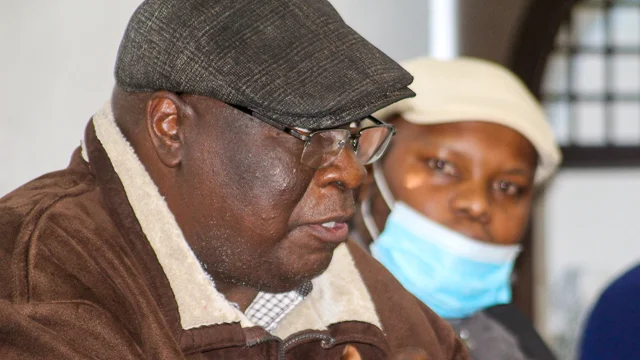
A continent in crisis: Rhodes University academics discuss how the Ukraine-Russia conflict will impact Africa
Date Released: Thu, 2 June 2022 08:51 +0200By Sam van Heerden, freelance writer and Rhodes University alumna
The Ukraine-Russia conflict has not only devasted many parts of Ukraine but is also having ripple effects throughout the world. The challenges it presents to Africa are particular to its vulnerabilities. At an event hosted by the Internationalisation Office, the Law Faculty, and the Africa Centre, academics from Rhodes University discussed how the war would affect the African continent.
“Economically, it is imperative that we resolve this conflict,” said Lecturer in Economics and Economic History, Dr Sibanisezwe Alwyn Khumalo. “The fallout from the war will decimate the African economy.”
Ukraine and Russia are two of the world’s major grain baskets and an important source of oil for Europe. Food shortages, the rising price of oil, and increasing costs of living caused by the conflict are set to harm people worldwide, particularly those in developing countries with more vulnerable populations, such as South Africa.
Rather than working together, many countries are also taking a nationalist stance when responding to these shortages. Dr Khumalo explained that countries are engaging in behaviours that would not be expected in the international system, such as stopping their exports of oils, wheat and other food goods that are becoming sparse. “People are focusing on their own security, and we are secondary to those concerns,” said Dr Khumalo.
Although this could present opportunities, such as encouraging African states to grow the increasingly scarce foods locally, Dr Khumalo explained that countries are still reeling from the economic fallout of COVID-19. Consequently, they might struggle to adapt to these crises. Because of the increasing economic vulnerability of South Africans, he also warned that this could spark greater civil unrest, such as what was witnessed in Durban last year.
Africa has also been marginalised in other areas when it comes to the fallout of the conflict. Along with other students from the developing world studying in Ukraine, African students, among them about 50 South Africans, were reportedly sidelined as they tried to flee the war, despite an imperative from the European Union (EU) that students from developing states should be admitted to other EU countries for humanitarian reasons. The International Organisation for Migration received information about discrimination and xenophobia taking place based on people’s race, ethnicity, and nationality.
“If you were not a Ukrainian passport holder, you treated very differently when trying to exit the country and in some of the transition countries,” explained the Director of the Internationalisation Office, Ms Orla Quinlan. “This is just another example of people being treated very differently in sudden onset crises, even though everyone is trying to escape the same [dire] situation.”
Despite these issues, South Africa has tried to tow the neutral line in its response to the conflict. Rather than condemning Russia, South Africa has called for both Ukraine and Russia to engage in dialogue and conflict resolution. Associate Professor of Political and International Studies, Eduard Jordaan criticised this move as a strategic error: Russia’s invasion of Ukraine has violated international norms regarding respecting state sovereignty and independence, and Russia’s ability to do this weakens this norm.
He predicts that Ukraine will gradually be ground down and weakened. “On their own, they are not strong enough to fight Russia,” he explained. “South Africa [is supporting] a world where power dominates.”
To make matters worse, it remains to be seen whether international law can help solve the crisis. Dean of the Faculty of Law, Professor Laurence Juma, recalled how Ukraine did not rely on the prohibition against use of force contained in the United Nations Charter to protest Russia’s invasion at the International Court of Justice (ICJ), even though the Charter prohibits such actions. This is because Russia could have opted out of the jurisdiction of the ICJ and not participate in the proceedings.
Instead, Ukraine relied on the Genocide Convention which confers automatic jurisdiction of all matters to the ICJ provided that the state or states in question are parties to the treaty. Ukraine’s case was based on the claims Russia had made that Ukraine was committing genocide against sections of its own people in the Dombass region. Ukraine denies this.
“Ukraine went to the ICJ asking for them to issue a provisional order to stop the war on the basis that there is urgency and there is irreparable harm,” Professor Juma explained. Although the court granted the request and ordered Russia to stop its invasion, the enforcement of the order will present some challenge. Ideally, Ukraine could file a notice of non-performance with the UN Security Council. However, Russia can again use its veto powers to block any action. The matter is yet to go to full hearing. Ukraine is expected to file its pleadings by September, and Russia is expected to respond by March 2023. But by then, much damage will already be done.
Nonetheless, every challenge provides opportunities for growth and change. Despite the grave situation that Africa and the rest of the world find themselves in regarding the war, the panel offered some seeds of hope. Professor Juma believes that we can use the situation to our advantage: “We can make our positions clear. By asserting fairness and equality in the international order.”
While international law takes its time, Ms Quinlan has faith that ordinary people can change the tides: “My hope is that we will see a groundswell of active citizens in Europe, and beyond, putting pressure on their governments to stop this war. Because the repercussions [of this war] ring out far beyond the two countries immediately involved. We cannot afford to have another completely destabilising situation in the world.”
Source:Communications

